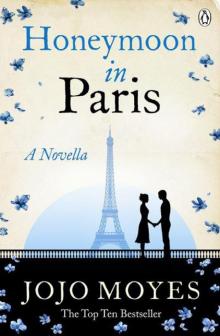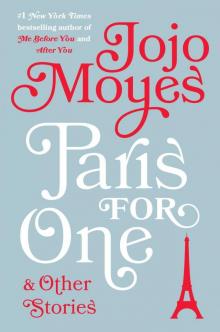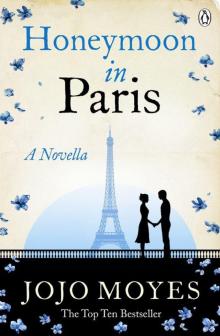- Home
- Jojo Moyes
Windfallen Page 2
Windfallen Read online
Page 2
"There. Do you think that's enough?"
Lottie peered at the handful of flowers. "You really want to go up there? Just to gawp at her things?"
"Oh, and you don't, Mother Superior?"
The two girls grinned at each other and then sprinted back toward the municipal park, cardigans and skirts flying out behind them.
THE DRIVE TO ARCADIA HOUSE HAD ONCE BEEN CIRCULAR; its remaining neighbors could still remember processions of long, low cars that halted with a crisp bite of gravel before the front door, then continued around its graceful sweep and exited back down the lane. It had been an important house, sited well inside the railway tracks (so significant was this distinction that houses in Merham were advertised as either "inside" or "outside"). It had been built by Anthony Gresham, the eldest son of the Walter Greshams, when he returned from America, having made his fortune creating an unremarkable piece of engine equipment that was bought by General Motors. He had wanted it, he said grandly, to look like a film star's house. He'd seen a house in Santa Monica, owned by a famous actress of the silent screen, that was long and low and white with great expanses of glass and smaller windows like portholes. It spoke to him of glamour and new worlds and a brave, bright future (a future that, ironically, had not been his; he died aged forty-two after being hit by a car. A Rover). When the house had been finally completed, some of Merham's residents had been shocked by its modernity and had complained privately that it was not, somehow, "fitting." So that when the next owners, the MacPhersons, finally moved out several years later and it was left empty, a few of the older villagers felt curiously relieved, although they might not have said as much.
Now the northern side of the drive had become completely overgrown, a tangle of brambles and elder prematurely ending it by the gate that once led to the sea path and causing a large amount of gear crunching and swearing from those drivers of the delivery vans who, having offloaded the last of their cargo, were now trying to reverse around each other back to the lane, partially blocked by a car that had entered behind them.
Lottie and Celia stood for a while watching the puce faces and sweaty efforts of those still carrying furniture, until a tall woman with long chestnut hair pulled severely into a bun ran out, waving a set of car keys and pleading with them "just to wait a moment. Hold on. I'll move it over to the kitchen garden."
"Do you think that's her?" whispered Celia, who had inexplicably ducked behind one of the trees.
"How would I know?"
Lottie held her breath, Celia's sudden reticence having prompted her own sudden sense of awkwardness. They pressed close to each other, peering around the trunk, holding their full skirts tight behind them with their hands to stop them from billowing out.
The woman sat in the car and looked around her at its instruments, as if considering which one she should use. Then, with an anguished bite of her lower lip, she started the ignition, wrestled with the gearshift, and, relaxing slightly, took a deep breath and shot straight backward with an almighty crunch into the front grille of a removal van.
There was a brief silence, followed by a loud expletive from one of the men and the lengthy blast of a horn, and then the woman raised her head and the girls realized that she had likely broken her nose. Blood was everywhere--down her pale green blouse, over her hands, even on the steering wheel. She sat straight upright in the driver's seat looking a little stunned, and then, glancing down, began to search for something to stem the bleeding.
Lottie found herself running across the overgrown lawn, her handkerchief already in her hand.
"Here," she said, reaching the woman at the same time as several exclaiming people began to congregate around the car. "Take this. Put your head back."
Celia, who had hurried behind Lottie, peered at the woman's spattered face. "You've taken an awful crack," she said.
The woman took the handkerchief. "I'm so sorry," she was saying to the lorry driver. "I'm just no good with gears."
"You shouldn't be driving," said the man, his bulk barely contained by his dark green apron, who was clutching what remained of his front light. "You didn't even look in the mirror."
"I thought I was in first. It's awfully close to reverse."
"Your bumper's fallen off," said Celia with some excitement.
"It isn't even my car. Oh, dear."
"Look at my light! I'll have to get a whole new unit for that. That's going to cost me time as well as money."
"Of course." The woman nodded sorrowfully.
"Look, leave the lady alone. She's taken quite a knock." A dark-haired man in a pale linen suit had appeared at the car door. "Just tell me what the damage is and I'll see you right, all right? Frances, are you hurt? Do you need a doctor?"
"She shouldn't be driving," said the man, shaking his head.
"You shouldn't have been so close," said Lottie, irritated by his lack of concern. The driver ignored her.
"I'm so sorry," the woman muttered. "Oh, dear. Look at my skirt."
"Come on, how much? Fifteen shillings? A pound?" The younger man was peeling notes off a roll he had taken from his inside pocket. "There, take that. And take another five for your troubles."
The driver looked mollified. He probably didn't even own the van, thought Lottie.
"Well," he said. "Well, I guess that'll have to do." He pocketed the money swiftly, his martyrdom apparently tempered by an astute determination not to push his luck. "I suppose we'll be finishing up, then. C'mon, lads."
"Look at her skirt," whispered Celia, nudging Lottie. Frances's skirt was almost down to her ankles. In a bold print of willows, it was curiously old-fashioned. Lottie found herself studying the rest of the woman's clothes: her shoes, which looked almost Edwardian, her lengthy string of globular amber beads. "Bohemians!" she hissed gleefully.
"C'mon, Frances. Let's get you inside before you start bleeding all over the interior." The young man stuck his cigarette in the side of his mouth and gently took the woman's elbow, helping her from the car. As she walked toward the house, she turned suddenly.
"Oh, your lovely handkerchief. I've covered it with blood." She paused, looking at it. "Are you local? Do come and have some tea. We'll get Marnie to soak it. It's the least I can do. George, do call Marnie for me. I'm afraid I might splutter."
Lottie and Celia glanced at each other.
"That would be lovely," said Celia. It was only after they shut the door behind them that Lottie realized they must have left the flowers on the drive.
CELIA SEEMED LESS SURE WHEN SHE ENTERED THE MAIN hallway. IN fact, she came to such a juddering halt that Lottie, who hadn't been concentrating, smacked her own nose on the back of Celia's head. This was less to do with any natural tendency toward hesitation on Celia's part (in fact, her nickname among her younger siblings was "sharp elbows") than with her coming face-to-face with the large painting stacked against the curving banister opposite the front door. On it, in impasto oils, a naked woman reclined. She was not, Lottie observed from the positioning of her arms and legs, the modest sort.
"Marnie? Marnie, are you there?" George led the way, striding across the flagstone floor, past the packing cases. "Marnie, can you get us some warm water? Frances has had a bit of a bump. And can you make some tea while you're there? We've got visitors."
There was a muffled answer from an adjoining room and the sound of a door closing. The lack of rugs and furniture meant that sound was amplified, bouncing off the stone floors and into the largely empty space. Celia clutched Lottie's arm. "Do you think we should stay?" she whispered. "They seem a bit . . . fast."
Lottie gazed around her at the house, at the racks of oversize paintings; at the stacked, rolled rugs, slumped against the walls like stooping, elderly gentlemen; at the African carving of a woman's bloated stomach. It was all so different from the houses she knew: her own mother's--cramped, dark, full of oak furniture and cheap porcelain knickknacks, permeated with the smell of coal dust and boiled vegetables, constantly interrupted by the noise
of traffic or next door's children playing outside; the Holdens'--a sprawling, comfortable mock-Tudor family home that seemed to be valued for what it communicated as much as what it housed. Their furniture was inherited and had to be treated reverently, more reverently, it seemed, than its occupants. No cups were to be placed upon it, no children to knock against it. It was all, Mrs. Holden announced, to be "handed on," as if they were simply guardians of these pieces of wood. Their house was permanently arranged for other people, made nice "for the ladies," made straight for Dr. Holden "when he comes home," with Mrs. Holden a fragile little King Canute, desperately trying to push back the inevitable dirt and detritus.
And then there was this place--white, bright, alien, a strange, angular shape with long, low, opaque windows, or portholes through which you could see the sea, filled with an elaborate and chaotically arranged treasure trove of exotica. A place where every item told a story, held a rich provenance from foreign lands. Lottie breathed in the house's scent, the salt air that had permeated the walls over years, overlaid by the smell of fresh paint. It was strangely intoxicating. "Tea can't hurt. Can it?"
Celia paused, scanning her face. "Just don't tell Mummy. She'll fuss."
They followed the mournful Frances into the main living room, which was flooded with light from the four windows that faced outward onto the bay, the two middle ones curved around a semicircular wall. On the farthest window to the right, two men were struggling with a curtain pole and heavy drapery, while to their left a young woman was kneeling in the corner, placing lengths of books into a glass-fronted bookcase.
"It's Julian's new car. He's going to be absolutely furious. I should have let you move it." Frances lowered herself onto another chair, checking the handkerchief for new blood.
George was pouring Frances a large glass of brandy. "I'll sort Julian out. Now, how is your nose? You look like something by Picasso, dear girl. Do you think we need a doctor? Adeline? Adeline? Do you know a doctor?"
"My father's a doctor," said Celia. "I could call him if you like."
It was several seconds before Lottie noticed the woman. She sat perfectly upright in the center of a small, upright sofa, her legs crossed at the ankles and her hands clasped in front of her, as if completely removed from the chaotic exertions around her. Her hair, which was the kind of blue-black seen on ravens' feathers, sat close to her head in sleek waves, and she wore a red dress of oriental silk, cut unfashionably long and close; over that was an embroidered jacket upon which peacocks preened their iridescent plumage. She had huge, dark eyes rimmed in kohl, and tiny child's hands. She was so still that when she dipped her head in greeting, Lottie nearly jumped.
"Aren't you marvelous? There, George. You have found us some scouts already." The woman smiled, the slow, sweet smile of the perennially charmed.
Her accent was unfathomable, perhaps French, definitely foreign. It was low and smoky and held a sneaking lilt of amusement. She was way beyond the realms of experience, even of someone whose upbringing stretched further than the twin poles of Manningtree and Walton-on-the-Naze. Lottie was transfixed. She looked at Celia, seeing her own gormless expression reflected back at her.
"Adeline. This is--Oh, goodness, I didn't ask you your names." Frances raised a hand to her mouth.
"Celia Holden. And Lottie Swift," said Celia, who was doing something odd with her feet. "We live behind the park. On Woodbridge Avenue."
"The girls very kindly lent me their handkerchief," said Frances. "I've made rather a mess of it."
"You poor darling." Adeline took Frances's hand.
Lottie watched, waiting for her to offer some comforting squeeze, some reassuring pat. Instead, stroking it gently, she lifted it to her ruby mouth and there, in front of everyone, without even a hint of a blush, bent slowly and kissed it. "How awful for you."
There was a short silence.
"Oh, Adeline," said Frances sadly, and pulled her hand away.
Lottie, the air knocked from her lungs at this bizarre demonstration of intimacy, dared not look at Celia. But then Adeline, after a momentary pause, turned back to the room, and her smile grew into a full-wattage beam.
"George, I didn't tell you. Isn't this sweet? Sebastian has sent down some artichokes and plovers' eggs from Suffolk. We can have them for supper."
"Thank goodness." George had walked over to the men by the window and was helping support the curtain pole. "I wasn't in the mood for fish and chips."
"Don't be such a snob, darling. I'm sure the fish and chips here are absolutely wonderful. Are they, girls?"
"We really wouldn't know," said Celia hurriedly. "We only eat at proper restaurants."
Lottie bit her tongue, remembering the previous Saturday, when they had sat on the seawall with the Wester-house brothers eating skate from greasy newspaper.
"Of course you do." Her voice was languorous and faintly accented. "How very proper of you. Now, girls, you will tell me, what is the single best thing about living in Merham?"
Celia and Lottie stared at each other.
"There's not much," Celia began. "In fact, it's rather a bore. There's the tennis club, but that shuts in the winter. And the cinema, but the projectionist gets ill a lot, and they don't have anyone else who can operate it. If you want to go somewhere smart, you really have to go to London. That's what most of us do. I mean, if we want a really good night--if you want to go to the theater, or a really top restaurant--" She was speaking too fast; trying to look insouciant, yet stumbling over her own untruths. Lottie looked at Adeline's face, its smile of interest becoming just slightly blank, and she felt suddenly overwhelmed with fear that this woman was going to write them off.
"The sea," she said abruptly.
Adeline's face turned to meet hers, her eyebrows lifting slightly.
"The sea," she said again, trying to ignore Celia's furious expression. "Living right by it, I mean. It's the best thing. Hearing it in the background all the time, smelling it, walking along the shore and being able to see the curve of the earth . . . knowing when you look out that there is so much going on underneath it that we shan't ever see, or know about. Like this big mystery, right on our doorstep. . . . And the storms. When the waves come right up over the wall and the wind blows the trees so hard that they bend over like grass, and being inside watching when you're all warm and cozy and dry . . ." She began to falter, caught Celia's mutinous face. "That's what I like anyway."
There was a short silence.
"It sounds perfect," said Adeline, lingering over the last word, her eyes fixed on Lottie's so that the girl blushed. "I am already so glad we came."
"SO HOW BADLY DID SHE DAMAGE THE VAN? DO YOU think they'll bring it to my dad's?"
Joe pushed his empty coffee cup across the Formica bar, his expression serious. But then Joe didn't really have any other expressions. His grave eyes, always peering upward as in deferential concern, looked out of place on that freckled, ruddy face.
"I don't know, Joe. It was only a light or something."
"Yes, but it will still need replacing."
Behind him, sometimes swamped by the sound of scraping chairs and cheap crockery, Alma Cogan sang of her "Dreamboat." Lottie glared at the undreamy features of her companion, wishing she had never mentioned their visit to Adeline Armand's house. Joe always asked the wrong questions. And usually managed to bring the conversation around to his father's garage. Joe, as the only son, would inherit the ramshackle business one day, and already this weighty inheritance hung as heavy on him as succession on a prince regent. She had hoped that by bringing him into her confidence about their extraordinary visit, he, too, might have been transported by the strange, exotic characters and the huge ocean liner of a house. That he, too, might have found himself far away from the tight little world of Merham's social confines. But Joe just focused on the mundane, his imagination constrained by the domestic (how had their maid prepared tea if they'd only just delivered the trunks? exactly which light was it that the woman broke? wouldn
't that fresh-paint smell have given them all a headache?), and Lottie found herself becoming both irritated that she had ever told him and sorely tempted to tell him about the painting of the naked woman, just to make him blush. It was so easy to make Joe blush.
She would have discussed it all with Celia. But Celia was not talking to Lottie. She had not spoken to her since their walk home, during which Celia had spoken rather too much. "Were you deliberately showing me up in front of those people? Lottie! I can't believe you started spouting all that stuff about the sea. As if you care about fish swimming about underneath it--you can't even swim!"
Lottie had wanted to talk to her about the provenance of Hungarian princesses and Adeline's kissing Frances's hand like a suitor, and about what relation George was to either of them (he didn't behave like anyone's husband. He had paid both women far too much attention). She wanted to talk about how, with all that work to do and her own house in absolute chaos, Adeline had just sat there in the middle of the sofa like she had nothing to do other than let the day go by.
But Celia was now deep in conversation with Betty Croft, discussing the possibilities for a trip to London before the end of summer. So Lottie just sat and waited for this particular summer storm to blow itself out.
Except Celia had evidently been more put out by Lottie's interruption than even she had said. As the afternoon drew on, and the blustery clouds outside grew darker and loaded with rain, and the cafe filled with recalcitrant children and their exasperated parents, still clutching their damp and gritty beach towels, she ignored Lottie's attempts to join in the conversation and her offer of a slice of bread-and-butter pudding, so that even Betty, who normally loved a good row between friends, started to look a bit uncomfortable. Oh, Lord, thought Lottie resignedly. I'm going to pay for this one.
"I think I'll head back," she said aloud, staring at the murky dregs of instant coffee in the bottom of her cup. "Weather's closing in."
Joe stood up. "Shall I walk you? I've got an umbrella."
"If you like."
Adeline Armand had had a portrait of herself propped up in what must have been the study. It hadn't been a proper painting--it was loose and choppy, as if the artist hadn't been able to see properly and had had to guess where the marks were meant to go. But somehow you could see it was her. It was that jet-black hair. And that half smile.

 Me Before You
Me Before You After You
After You The Last Letter From Your Lover
The Last Letter From Your Lover Still Me
Still Me Honeymoon in Paris
Honeymoon in Paris Night Music
Night Music The Girl You Left Behind
The Girl You Left Behind Windfallen
Windfallen One Plus One
One Plus One Paris for One and Other Stories
Paris for One and Other Stories The Giver of Stars
The Giver of Stars The Ship of Brides
The Ship of Brides The Peacock Emporium
The Peacock Emporium Silver Bay
Silver Bay The Horse Dancer
The Horse Dancer Peacock Emporium
Peacock Emporium Honeymoon in Paris: A Novella
Honeymoon in Paris: A Novella Ship of Brides
Ship of Brides Paris For One (Quick Reads)
Paris For One (Quick Reads)